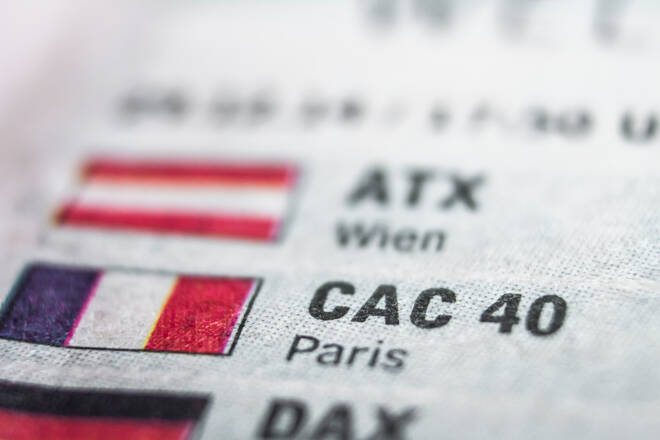Advertisement
Advertisement
France: Growth Slows as Repercussions of Russia-Ukraine Conflict Darken Inflation and Fiscal Outlooks
By:
Under a more stressed economic scenario, with higher and more long-lasting price pressures, output growth slows more significantly.
Rising spending in dealing with economic and geopolitical repercussions of Russia’s further incursion in the Ukraine additionally weigh on France’s already weakened fiscal outlook as recovery slows, exacerbating long-run credit challenges.
Our baseline economic forecast of France is for modest recovery with real growth of 3.6% for 2022 (-0.6pps from February expectations, Figure 1) before 2.1% in 2023 (-0.3pps), as growth slows across the euro area.
Under a more stressed economic scenario, with higher and more long-lasting price pressures, output growth slows more significantly. However, we assume the energy price shock proves temporary, given futures of oil and gas prices indicating a downward price trend over a next 12 months.
Figure 1. France’s real GDP growth – baseline economic scenario
%
One of the main knock-on effects is pressure on government to mitigate inflation and raise defence expenditure
One of the main adverse knock-on effects of Russia’s further invasion of the Ukraine for France is pressure the government at this stage faces in mitigating impact of rising inflation as well as to raise defence spending – just as, moreover, recovery from the Covid-19 crisis and associated revenue growth have started slowing.
The resulting excess deficit puts pressure on French public finances, which have already deteriorated under the context of the Covid-19 crisis, leaving the country with limited room to raise spending further. French general government debt reached around 115% of GDP in 2021, up from 98% of GDP in 2019.
On 16 March, the government announced a fresh package of measures aimed at provision of relief for households and firms hit by rising energy and other prices, including a discount of 15-euro cents a litre on petrol between April and July, energy-price related subsidies for firms and the strengthening of state-backed corporate liquidity facilities.
Including previously introduced budgetary support since last September, these measures amount to an aggregate cost of EUR 25bn (circa 1% of GDP). The government has as well started discussion around an increase of civil service salaries in response to rising costs.
France does have the advantage, as compared with Germany especially, of comparatively low reliance on oil and gas imports, given Electricité de France’s large park of nuclear power stations, helping ultimately contain France’s rate of inflation as compared with that of the rest of the euro area (Figure 2) and expected to cap additional government compensation paid to households and businesses.
Figure 2. France’s price protection: inflation in major euro area countries, January 2022
% YoY
The war in Ukraine has resulted in a rethink across Europe around military budget expenditure
However, France faces other upward pressures on public expenditure. As far as defence spending, the war in the Ukraine has resulted in a rethink across Europe around military budgets. After Germany’s announcement of a lifting of spending, partly via a EUR 100bn defence fund, the French government plans to further raise its defence budget.
France’s multiannual defence plan had already foreseen an increasing of defence spending to 2.0% of GDP by 2025, before the war in Ukraine escalated. The defence budget stood at EUR 39.2bn (1.6% of GDP) in 2021. Most candidates running in next month’s presidential election have pledged to raise defence spending, including incumbent Emmanuel Macron.
France faces longer-run spending challenges
France faces longer-run spending challenges too, most notably in meeting emissions-reduction objectives, enhancing digitalisation and addressing rising welfare costs associated with an ageing population.
Beyond the fiscal costs, the war in Ukraine also weighs on France’s economic outlook due to deteriorating external conditions and weaker business and consumer confidence. Weaker economic performance of major trading partners in the euro area such as with respect to the German economy, for which we revised down growth expectations to 3.5% (-0.9pps) for 2022, weighs down on demand for French exports.
Less direct risk to this war as well as to sanctions imposed on Russia
France is less exposed to direct risk from this war as well as to the sanctions adopted against Russia given less commercial and financial exposure to Russia and Ukraine as compared with that of most euro-area member states. However, much still rides on negotiations at European level surrounding funding of long-run challenges, including reform of European fiscal rules, and the French government’s capacity to offset spending pressure with cost savings and/or revenue-raising measures.
For a look at all of today’s economic events, check out our economic calendar.
Thomas Gillet is an Associate Director in Sovereign and Public Sector ratings at Scope Ratings GmbH. Thibault Vasse, Senior Analyst at Scope Ratings, contributed to writing this commentary.
About the Author
Thomas Gilletcontributor
Thomas Gillet is a Director in Scope’s Sovereign and Public Sector ratings group, responsible for ratings and research on a number of sovereign borrowers. Before joining Scope, Thomas worked for Global Sovereign Advisory, a financial advisory firm based in Paris dedicated to sovereign and quasi-sovereign entities.
Advertisement
